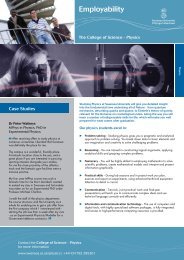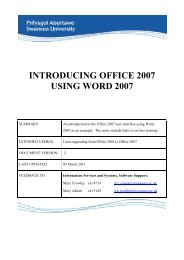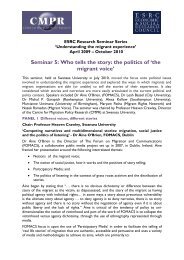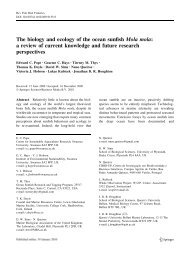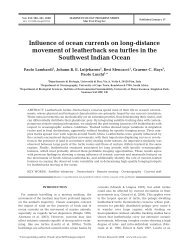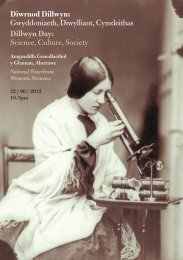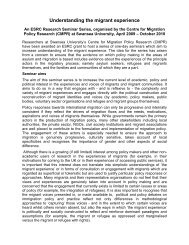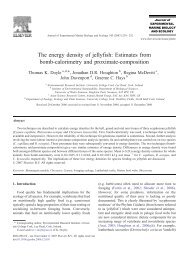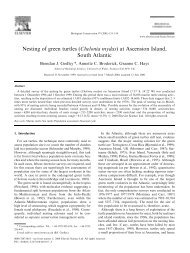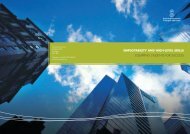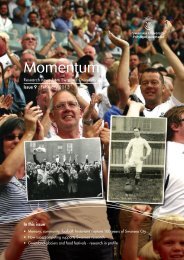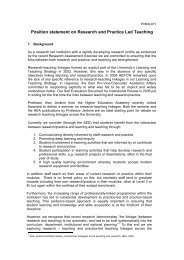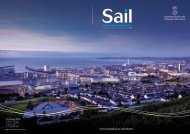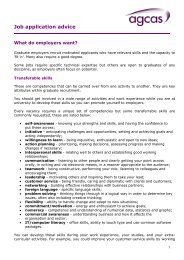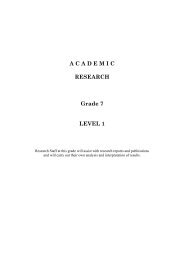Postgraduate Prospectus 2013 - Swansea University
Postgraduate Prospectus 2013 - Swansea University
Postgraduate Prospectus 2013 - Swansea University
You also want an ePaper? Increase the reach of your titles
YUMPU automatically turns print PDFs into web optimized ePapers that Google loves.
Translation and Interpreting Studies<br />
Entry requirements<br />
Normally a minimum of a lower class BA<br />
Honours degree 2.2 (with an overall average<br />
of 55% or above) in a related subject.<br />
English Language requirement:<br />
IELTS 6.5 (with a minimum of 5.5 in each<br />
component) or <strong>Swansea</strong> <strong>University</strong><br />
recognised equivalent. 6.0 is acceptable<br />
for the MA in Chinese-English Translation<br />
and Language Teaching.<br />
How the degrees are structured<br />
The full-time course structure is split across<br />
the year with three modules offered in each<br />
academic semester (a total of six modules<br />
in Part One) and then either two extended<br />
The global demand for translation<br />
services is growing rapidly as companies,<br />
institutions, and people around the world<br />
increasingly expect to buy goods and use<br />
services localised into their own<br />
language. Liaison (dialogue) interpreting<br />
is a key requirement of international<br />
business, and is widely used wherever<br />
individuals from another country have to<br />
interact with official bodies of all kinds<br />
(social services, hospitals, the police, etc).<br />
Translation and Interpreting Studies at<br />
<strong>Swansea</strong> gives you the opportunity to work<br />
intensively with languages. You will expand<br />
your knowledge in foreign languages and<br />
refine the command of your native<br />
language. Our postgraduate programmes<br />
are delivered by experienced staff in the<br />
Department of Languages, Translation and<br />
Media, many of whom are practising<br />
translators and interpreters. We place great<br />
emphasis on hands-on project work and<br />
vocational outcomes. The disciplines of<br />
Translation and Interpreting offer excellent<br />
job prospects. The increase in international<br />
contacts means that more and more<br />
well-qualified translators are necessary.<br />
With a good qualification in translation you<br />
can expect to share in a world-wide,<br />
multi-billion market.<br />
translations or a dissertation over the<br />
summer (Part Two). Each Extended<br />
Translation (5,000-6,000) words involves<br />
using a CAT tool and is accompanied by<br />
a reflective report.<br />
The Language Research Centre (LRC) at<br />
<strong>Swansea</strong> provides a distinct international<br />
and multidisciplinary forum for the<br />
advancement of the study of Translation,<br />
Language Technology, Public Service<br />
Interpreting and Multilingualism. Regular<br />
research seminars and lectures are run<br />
through this group and also through the<br />
Research Institute for Arts and Humanities<br />
(RIAH), which students are encouraged to<br />
attend.<br />
Our degrees will:<br />
• equip you with the skills relevant for a<br />
career in the language services industry<br />
world-wide<br />
• help you to gain transferable<br />
skills, including team working,<br />
communication, technological,<br />
presentation, and analytical skills<br />
• prepare you for a research degree<br />
(MPhil or PhD) if you wish to pursue<br />
that option<br />
The Department benefits from extensive<br />
library holdings and maintains a large<br />
collection of audio-visual materials. All<br />
postgraduate students have access to two<br />
computer-based language laboratories, an<br />
advanced Translation and Media<br />
computing lab and a more specialised<br />
Translation Research facility housing the<br />
latest digitisation, corpus analysis and<br />
computer-assisted translation tools.<br />
MA in Translation and Interpreting<br />
This programme is a variant of the MA<br />
Translation with Language Technology in<br />
which an emphasis on Public Service<br />
Interpreting (with an introduction to<br />
conference interpreting) replaces that on<br />
Language Technology (which however<br />
remains available as an option). It is<br />
designed to provide students with a<br />
For full information on programme<br />
structures and modules, please visit<br />
the website.<br />
Assessment<br />
These degrees are available by assessed<br />
coursework, extended translations or a<br />
dissertation.<br />
Scholarships and Bursaries<br />
A range of postgraduate scholarships and<br />
bursaries are available. For details, please<br />
visit: www.swansea.ac.uk/scholarships/<br />
<strong>Postgraduate</strong><br />
qualification which validates a wide range<br />
of professional skills and allow them to<br />
respond flexibly to the changing<br />
challenges of the language services<br />
market. Students take practical modules<br />
on interpreting in Local Authority and<br />
Healthcare settings. These are designed<br />
to prepare them to pass the examinations<br />
of the widely recognised Diploma in Public<br />
Service Interpreting of the professional<br />
body the Chartered Institute of Linguists.<br />
MA Literary Translation<br />
This well-established programme is<br />
designed to offer an independent scheme<br />
of study for advanced linguists, and a<br />
practical and theoretical training for those<br />
wishing to pursue a career in literary<br />
translation. It is also suitable for practising<br />
translators who do not yet have, but wish<br />
to gain, formal qualifications.<br />
Language pairs offered: English with<br />
French, German, Italian, Spanish or<br />
Welsh. Students will work in either one or<br />
two languages, plus English, and will take a<br />
complementary range of theory and<br />
practical translation modules, including<br />
Translation Theory and History of Translation.<br />
Students will also complete either a<br />
dissertation or two extended translations<br />
using language technology tools.<br />
How can I find out more?<br />
Visit our website:<br />
www.swansea.ac.uk/artsandhumanities<br />
Contact the Arts and Humanities<br />
<strong>Postgraduate</strong> Admissions Office:<br />
Email: pgahadmissions@swansea.ac.uk<br />
Tel: +44 (0)1792 606980/606981<br />
MA Translation with<br />
Language Technology<br />
By combining advanced translation work<br />
in administrative and technical domains<br />
with in-depth language technology<br />
training, this practical Master’s<br />
programme provides graduates with<br />
the skills and experience to become<br />
immediately productive in a modern<br />
professional environment, and puts them<br />
in a strong position to compete for work<br />
in the expanding worldwide language<br />
services industry. It’s vocational excellence<br />
has been recognised by inclusion in the<br />
European Commission’s prestigious<br />
European Master’s in Translation Network.<br />
See: www.ec.europa.eu/dgs/<br />
translation/programmes/emt<br />
Language pairs offered: Arabic, Chinese,<br />
Dutch, French, German, Italian, Polish,<br />
Spanish and Welsh into English: English<br />
into German, French, Italian, Spanish and<br />
Welsh.<br />
Visit the <strong>University</strong>:<br />
see page 174 for details<br />
Applications can be made online at:<br />
www.swansea.ac.uk/applyonline<br />
– see pages 176 – 177 for further<br />
information<br />
Key features of this Master’s<br />
programme include:<br />
• Emphasis on journalistic, administrative<br />
and technical translation<br />
• Solid grounding in the historical aspects<br />
and theoretical principles of translation<br />
• Advanced Language Technology<br />
training<br />
• The option to study another language<br />
at beginner or intermediate level<br />
• Optional ‘Skills lab’ module (simulated<br />
translation company with real world<br />
assignments)<br />
• Optional modules in Interpreting<br />
(Local Government or Healthcare<br />
settings), including an introduction to<br />
conference interpreting<br />
A wide range of other options in<br />
linguistics, web design and digital<br />
publishing, subtitling and video editing,<br />
translation studies and terminology<br />
management is also available. Students<br />
will also complete either a dissertation or<br />
two extended translations using language<br />
technology tools.<br />
European Master’s in Translation with<br />
Language Technology<br />
The two-year MAs are a variant of the<br />
existing EMT-recognised MA programmes<br />
in Translation and Interpreting.<br />
This programme is designed to be of<br />
particular interest to students based in<br />
continental Europe or planning to work<br />
(or take a further qualification) there after<br />
their degree. It is compliant with the EU’s<br />
‘Bologna’ pattern of higher education<br />
and so will be fully recognised around<br />
Europe. It allows students to take<br />
additional modules and includes the<br />
option of a semester of residence<br />
abroad (either at an EMT partner<br />
translation school or in a 13-week<br />
accredited internship).<br />
The MAs have been selected by the<br />
European Commission as one of the<br />
founder members of its European Master’s<br />
in Translation network. The network has<br />
34 members throughout Europe, all of<br />
whom are judged to offer a standard of<br />
training suitable for entry into the EU’s<br />
translation service, the DGT.<br />
Master’s Degrees – Translation and Interpreting Studies<br />
86<br />
87



